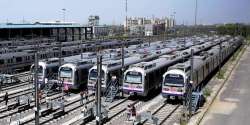Delhi Metro to modify air conditioning systems of trains to allow fresh air inflow
In a bid to allay people's fears of catching coronavirus infection in closed and cramped metro compartments, the Delhi Metro Rail Corporation has modified the air conditioning system of the trains to allow 100 percent inflow of fresh air.

In a bid to allay people's fears of catching coronavirus infection in closed and cramped metro compartments, the Delhi Metro Rail Corporation has modified the air conditioning system of the trains to allow 100 percent inflow of fresh air.
AC filters will also be thoroughly cleaned with sodium hypochlorite solution every seven days, as against the earlier norm of fifteen days. Besides this, earlier only 30 percent of fresh air was allowed inside the train, which has now been increased to its full capacity.
"Air conditioning system of trains has been modified to keep fresh air inflow to 100 percent open mode", said an official of the Delhi Metro Rail Corporation. Besides this, arrangements have also been made to allow fresh air to flow through all the underground stations.
According to Rupa Nandy, Head of the International Association of Public Transport, with such standard operating procedures in place, "sitting in the metro will be as good as being out in the open".
This comes amidst apprehensions associated with an air-conditioned public transport system. Alluding to a survey conducted by a French health agency, Nandy said that only one per cent of clusters are linked to transport.
Citing the data, she added that 24 per cent of coronavirus cases came from workplaces, 16 per cent from health care venues, 14 per cent from family gatherings, nine per cent from public events, and eight per cent from social accommodation.
Metro services will resume in a graded manner from September 7, across the country, but in a bid to avoid overcrowding at the stations and halt the spread of infection, the DMRC has released a set of new guidelines.
"We think the decision to resume the metro should have been taken much earlier in the initial phase of the unlockdown. The economy depends a lot on public transport. Not having a proper means of transportation restricts a lot of people from resuming work," said Nandy.
However, several epidemiologists believe that resumption of Delhi metro will further increase infections, while others think that it is necessary for the economy.
Dr DR Rai, former General Secretary of the Indian Medical Association (IMA) said, "I am not in favour of resumption of metro services. The government should have postponed it for another two-three weeks."
"Ten days ago, the daily cases were low and now they have tripled in number. With resumption, is the government inviting more infections? With its resumption, the government should be strict in asking the people to follow the rules," he added.
On the other hand, Dr Jugal Kishore, head of the department of community medicine at Safdarjung hospital, asserted that the time has come for people to resume their lives, step out and earn money.
"The infection will definitely increase but how long are you going to keep people in their houses? Whenever they will step out the infection will be there. It will not vanish. So, one should resume normal life now."
Kishore, however, stressed that metro should be resumed with stringent implementation of precautionary measures and its frequency must also be increased so that the crowds are better managed.
Another health expert said that the resumption of services is not based on epidemiological data but on economic considerations. "There are economic or political reasons why it is being opened. It is date-driven and not data-driven," said Dr Lalit Kant, former head of epidemiology and communicable diseases at ICMR.
Kant added, "What is being done is being done because thousands of people are not getting money to eat. So, the government has to do a balancing act of opening up the economy slightly."